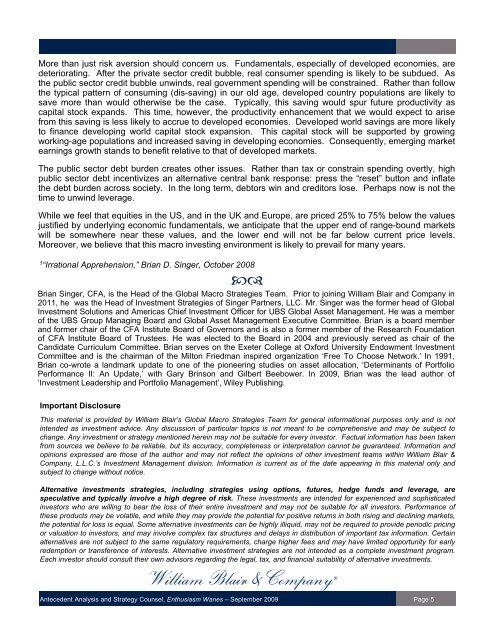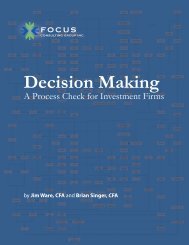Enthusiasm Reigns - Dynamic Allocation Strategies
Enthusiasm Reigns - Dynamic Allocation Strategies
Enthusiasm Reigns - Dynamic Allocation Strategies
Create successful ePaper yourself
Turn your PDF publications into a flip-book with our unique Google optimized e-Paper software.
More than just risk aversion should concern us. Fundamentals, especially of developed economies, aredeteriorating. After the private sector credit bubble, real consumer spending is likely to be subdued. Asthe public sector credit bubble unwinds, real government spending will be constrained. Rather than followthe typical pattern of consuming (dis-saving) in our old age, developed country populations are likely tosave more than would otherwise be the case.Typically, this saving would spur future productivity ascapital stock expands. This time, however, the productivity enhancement that we would expect to arisefrom this saving is less likely to accrue to developed economies. Developed world savings are more likelyto finance developing world capital stock expansion. This capital stock will be supported by growingworking-age populations and increased saving in developing economies. Consequently, emerging marketearnings growth stands to benefit relative to that of developed markets.The public sector debt burden creates other issues. Rather than tax or constrain spending overtly, highpublic sector debt incentivizes an alternative central bank response: press the “reset” button and inflatethe debt burden across society. In the long term, debtors win and creditors lose. Perhaps now is not thetime to unwind leverage.While we feel that equities in the US, and in the UK and Europe, are priced 25% to 75% below the valuesjustified by underlying economic fundamentals, we anticipate that the upper end of range-bound marketswill be somewhere near these values, and the lower end will not be far below current price levels.Moreover, we believe that this macro investing environment is likely to prevail for many years.1“Irrational Apprehension,” Brian D. Singer, October 2008Brian Singer, CFA, is the Head of the Global Macro <strong>Strategies</strong> Team. Prior to joining William Blair and Company in2011, he was the Head of Investment <strong>Strategies</strong> of Singer Partners, LLC. Mr. Singer was the former head of GlobalInvestment Solutions and Americas Chief Investment Officer for UBS Global Asset Management. He was a memberof the UBS Group Managing Board and Global Asset Management Executive Committee. Brian is a board memberand former chair of the CFA Institute Board of Governors and is also a former member of the Research Foundationof CFA Institute Board of Trustees. He was elected to the Board in 2004 and previously served as chair of theCandidate Curriculum Committee. Brian serves on the Exeter College at Oxford University Endowment InvestmentCommittee and is the chairman of the Milton Friedman inspired organization ‘Free To Choose Network.’ In 1991,Brian co-wrote a landmark update to one of the pioneering studies on asset allocation, ‘Determinants of PortfolioPerformance II: An Update,’ with Gary Brinson and Gilbert Beebower. In 2009, Brian was the lead author of‘Investment Leadership and Portfolio Management’, Wiley Publishing.Important DisclosureThis material is provided by William Blair’s Global Macro <strong>Strategies</strong> Team for general informational purposes only and is notintended as investment advice. Any discussion of particular topics is not meant to be comprehensive and may be subject tochange. Any investment or strategy mentioned herein may not be suitable for every investor. Factual information has been takenfrom sources we believe to be reliable, but its accuracy, completeness or interpretation cannot be guaranteed. Information andopinions expressed are those of the author and may not reflect the opinions of other investment teams within William Blair &Company, L.L.C.’s Investment Management division. Information is current as of the date appearing in this material only andsubject to change without notice.Alternative investments strategies, including strategies using options, futures, hedge funds and leverage, arespeculative and typically involve a high degree of risk. These investments are intended for experienced and sophisticatedinvestors who are willing to bear the loss of their entire investment and may not be suitable for all investors. Performance ofthese products may be volatile, and while they may provide the potential for positive returns in both rising and declining markets,the potential for loss is equal. Some alternative investments can be highly illiquid, may not be required to provide periodic pricingor valuation to investors, and may involve complex tax structures and delays in distribution of important tax information. Certainalternatives are not subject to the same regulatory requirements, charge higher fees and may have limited opportunity for earlyredemption or transference of interests. Alternative investment strategies are not intended as a complete investment program.Each investor should consult their own advisors regarding the legal, tax, and financial suitability of alternative investments.Antecedent Analysis and Strategy Counsel, <strong>Enthusiasm</strong> Wanes – September 2009Page 5



